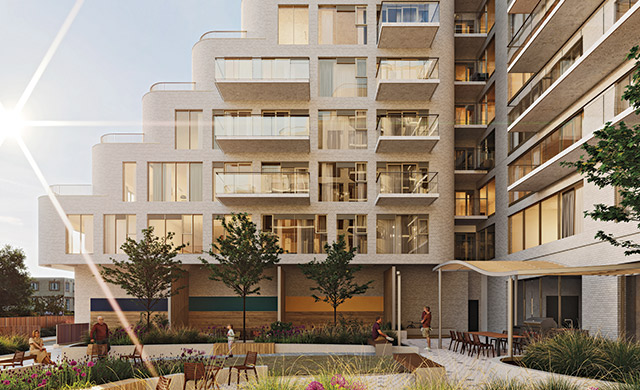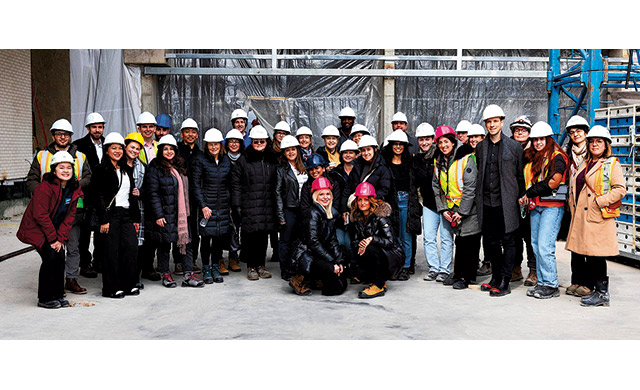By Emily Fielden, Policy and Communications Analyst, CHBA
As Executive Vice-President of Urban Capital and President of Spotlight Development, Taya Cook and Sherry Larjani find themselves as part of only a few women sitting in top leadership positions in the residential development industry.

Cook, who worked her way up the ranks at Urban Capital for 20 years, now oversees many of the company’s development projects from start-to-finish.
Larjani founded Spotlight Development in 2010 with a vision to change the way development is done. Through partnerships with recognized builders in the Greater Toronto Area, the company, which has a for-profit and not-for-profit arm that follows a 70-per-cent affordable housing methodology, acquires properties for redevelopment into high-density residential and mixed-use projects.
Both women are what anyone would consider professional powerhouses. They successfully navigate the challenges of being women in a male-dominated sector, while tackling the financial, labour and materials, and policy challenges that their companies face in their quest to build more homes and communities for Canadians.
Both Cook and Larjani agree that there are opportunities for the sector to recognize the often-hidden achievements of women in residential development – so in 2019 they set out on a mission to highlight the talented women in the industry.
Together, Cook and Larjani are the visionaries behind an all-female residential development team, which is leading the change for women in the sector, and girls interested in a future in residential construction.

Changing the narrative
The idea of an all-female development team was conceived when Cook was taken aback by a headline that featured 20 of Toronto’s “condo kings” – all of whom, as the name suggests, were men.
“Seeing that headline sparked something in me,” says Cook. “I’ve worked with many accomplished women in the development industry who don’t get the credit they deserve or have a seat at the table.”
It was this experience that compelled Cook to reach out to Larjani to partner on an all-female-led development project.
And with that, Reina – which means “queen” in Spanish – was born. The condo, which recently topped-off and is anticipating occupancy beginning January 2025, is located in Etobicoke, a sought-after area on the outskirts of Toronto.

Women led all aspects of Reina’s development process from engineering to architecture to urban planning and construction management. The result is a game-changing development that showcases how condos can be built differently when inspired, designed and executed by women.
Both Cook and Larjani agree that their experience working on Reina was different than other projects they’d previously worked on. “It was nice to see women sitting at the table,” says Larjani.
“The experience was free of any ego, and that ignited some really productive and collaborative discussions which resulted in some brilliant ideas.”
Along with the desire to improve the visibility of women in the residential construction industry, Cook and Larjani wanted to highlight how improvements in space design, security and lighting can make buildings more welcoming for all residents. And to that end, they were highly successful.

Design by collaboration
Reina is aptly referred to as a complete reinvention of urban condominium living – and for good reason. Not only did the project re-envision the way developments have traditionally been conceived, it also incorporates features that are often overlooked by the development industry.
To conceptualize the nine-storey, 200-unit condo, the development team took a radically new approach – they asked the community for their input well ahead of the design phase.

“We prioritized the front-end of development, which, I think, came from our collective interest and curiosity of doing something different,” says Cook.
Through a year-long public consultation period, which included a design meeting attended by 175 members of the public, design contests for university students and grade school children, and a variety of focus groups, the development team actively sought out ideas from the neighbourhood and intentionally incorporated their feedback into the project.
“We even had a design session with the Girl Guides that inspired Reina’s Japanese-style cafe,” says Cook.
As one of the first developments in Toronto to use the City’s Growing Up Guidelines as a model for smart family development, Reina offers ample two- and three-bedroom units and family-friendly amenities. The project also incorporates fully accessible floorplans designed for a wide range of abilities and ground-floor units with in-law suites that join on the inside.

Other unique features of the project include stroller parking on every floor, extra-wide hallways with clear sight lines to prioritize safety, accessibility and comfort, ample in-suite storage, and spaces to accommodate all age groups.
With a fully equipped gym and yoga studio adjacent to a windowed playroom, indoor and outdoor workstations, and a 6,500-sq.-ft. courtyard, among other features, the project boasts 25 per cent more interior amenity space than is standard in Toronto, and almost double the exterior space.
Navigating industry challenges
In addition to being women in a male-dominated industry, Cook and Larjani share the same frustrations as other developers across the country. Project financing, labour and materials shortages, and delays are significant barriers to getting their developments approved and built. Further, rising development charges, unnecessary red tape and government inconsistencies continue to exacerbate those challenges.
Larjani, who sits on BILD GTA’s Principals Advocacy Advisory Committee, which aims to help both media and government better understand the residential construction industry in the GTA, notes that rapidly changing policymaking without consideration of unintended consequences is a growing headache for the sector.

“It’s really a shame that media and policymakers zero in on miniscule issues within the sector, when they could be showcasing and championing all the great things homebuilders and developers are doing to make our communities better,” says Larjani.
Cook and Larjani also pointed to labour shortages in the industry as a constant pain-point, specifically amongst women and underrepresented groups. “Truthfully, there is still very little female representation in the residential construction industry,” says Larjani.
For the Reina project, Cook and Larjani were extremely intentional about wanting to have women working on all aspects, including in the skilled trades. “I think the fact that we were able to find very few women available in key trades, like electricians or heavy equipment operators, really brought to light just how huge the labour gap is,” Larjani adds.
According to 2022 BuildForce data, women make up just five per cent of the residential construction industry workforce. Cook and Larjani hope to see that change.
“We both love that our jobs allow us to make a tangible difference in people’s lives,” says Cook. “With Reina, we hope to show women and girls that a career in the development industry is fulfilling,
meaningful work that isn’t exclusively reserved for men.”

Inspiring an inclusive future
With Reina in the final stages of construction, both Cook and Larjani hope that the project will inspire more young girls and women to join the industry – with more men championing them every step of the way. Both women emphasize that the Reina project was not about excluding men from the process; it was about spotlighting the talents of their female colleagues.
“I’ve been positively impressed by the many men who have reached out to us as a result of our story,” Cook says. “I think it’s important that more men take the opportunity to recognize the immense impact that diversity has in conceptualizing smart design.”
Larjani echoes Cook’s sentiment. “My hope is that in future, we won’t have to put together all-female development teams just to prove a point,” says Larjani. “By embracing inclusivity, our industry can create more thoughtful developments that fulfill the needs and values of people from all backgrounds, in all walks of life, for generations to come.”











